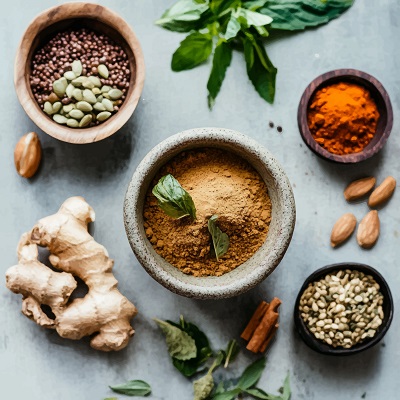 When the fall season begins, it is the perfect time to start cooking and baking more often. Not only will it provide you with new flavors by using these spices, but you also get a lot of health benefits you might not have been aware of.
When the fall season begins, it is the perfect time to start cooking and baking more often. Not only will it provide you with new flavors by using these spices, but you also get a lot of health benefits you might not have been aware of.
Here are 5 amazing fall spices that are also loaded with important nutrients:
Nutmeg
The first spice you can use not only for your favorite fall dishes, but also for health purposes, is nutmeg. If you have ever made treats in the fall season, you have most likely used nutmeg. What you might not know is that it has a lot of health benefits in addition to being tasty.
Nutmeg is almost always shipped from other countries, since the nutmeg trees are native to areas of the Spice Islands and East Indies. The nutmeg tree contains seeds, which have kernels inside them. These kernels can be ground up, which is where you get the nutmeg spice.
The flavor of nutmeg is a nutty and sweet spice, often used in Western recipes, and many Asian recipes as well. Not only can you get ground nutmeg for your dishes, but nutmeg essential oil is also available for even more health benefits.
Health Benefits of Nutmeg
So, why should you use nutmeg? It isn’t just because this is a wonderfully delicious and versatile spice. It also has a long list of health benefits. Here are some of the ways nutmeg can benefit your physical and mental health:
- It is loaded with nutrients – Nutmeg has a lot of nutrients just in a simple serving. It contains plenty of vitamins and minerals, including magnesium, folate, fiber, vitamin B 6, and manganese.
- Nutmeg helps with your insomnia – If you are suffering from insomnia, nutmeg is an excellent spice to add to your kitchen. It helps to calm the mind and help relax you for bed.
- Nutmeg helps with digestion – Nutmeg, like many other fall spices, can help with your digestion, including relieving constipation.
- You can use it for natural pain relief – Don’t forget nutmeg also has a natural property that works similar to menthol, where it can relieve minor pain in the body.
Ways to Use Nutmeg
If you are new to using this spice, you might not be entirely sure how to use it for your dishes. Here are a few options to help get you started:
- Make spiced coffee or cider – Nutmeg is really easy to add to hot and cold drinks, especially when you mix in other spices like cinnamon and allspice. It tastes great in spiced cider and coffee drinks.
- Add it to your roasted veggies – Make a pan of roasted fall vegetables like squash, pumpkin, and sweet potatoes, and sprinkles some olive oil and nutmeg on top.
- Try it in your breakfast baked goods – Nutmeg is perfect with your breakfast foods, from pancakes to sweeter baked goods like muffins.
Cinnamon
If you are like most people, you are probably no stranger to the delicious taste of cinnamon. However, like many spices on this list, the health benefits are often surprising. Cinnamon has actually been used as a medicinal spice for many years, not just for flavoring your foods and drinks.
Cinnamon is harvested from the bark of different types of evergreen trees, with different varieties coming from all over the world. The majority of the cinnamon you find in stores is Ceylon cinnamon, coming from Sri Lanka.
Then there is cassia cinnamon, most often harvested in Indonesia. You might also have cinnamon from China.
Health Benefits of Cinnamon
Cinnamon should be added to your spice collection to help improve your health while also adding more flavor to your dishes. Take a look at some of the top health benefits of cinnamon:
- There are lots of nutrients – Like nutmeg and other spices on this list, you are getting multiple nutrients from cinnamon without realizing it. There is no fat, sugar, or carbs in cinnamon, and it is low in calories. However, it contains a good amount of fiber, iron, calcium, and vitamin K.
- It is packed full of antioxidants – If you are looking for ways to get more antioxidants, having cinnamon every day is the perfect way to start. The antioxidants in cinnamon are known to help increase your immunity and boost your immune system, fight off illnesses and bacteria, and even help fight against bacterial infections.
- Cinnamon reduces inflammation – Having extra inflammation in the body can be disastrous and painful if you have arthritis. The inflammation is where the pain in your joints comes from, and can also worsen pain from chronic conditions like Crohn’s disease and gout. Cinnamon is a natural anti-inflammatory spice, so you can use it for chronic pain and also reduce inflammation that leads to brain problems and heart disease.
Ways to Use Cinnamon
There are many ways to use cinnamon on a daily basis, from your drinks to the foods you eat. During the fall, these methods are good to try out:
- Sprinkle some cinnamon on top of your coffee, tea, or other morning drinks
- Add cinnamon to your smoothies for a boost in flavor and health properties
- Use cinnamon with other spices to roast fall vegetables
- Mix in cinnamon with your baked goods
These are definitely not the only ways you can use cinnamon and get all of these health benefits, but they are good places to start. Don’t be afraid to experiment a little and see what you come up with.
Clove
The next fall spice that you can use for health is clove. People are often unfamiliar with clove, aside from adding it to oranges for deodorizing a home, or using it alongside other spices on this list for baked goods and spiced drinks. However, there are many health benefits to clove, giving you lots of great reasons to use it more often.
Many spices come from parts of Asia, and clove is no exception. It has been around since the 13th century, providing flavor and medicinal properties in Asia. It can also be found in many other countries, from Africa to Europe.
Health Benefits of Clove
You can use clove in a few different ways for health, from using the actual cloves themselves in dishes, ground clove in your spiced foods and drinks, and clove essential oil for aromatherapy and natural health remedies. Look at the different ways you can benefit from clove:
- Use the essential oil for aromatherapy – If you like to use essential oils, you are probably familiar with the different methods. You can use the oils directly in a diffuser, where you inhale the scent as it surrounds you, add oils to a bath, or make simple DIY care products with the oils. Clove oil is available for aromatherapy, helping to relax you and provide many health properties.
- Balance out your blood sugar levels – People with diabetes often look for natural remedies to use for their disease in addition to medical treatments. While clove should not replace medical care, it can add to balancing your blood sugar levels if you have type 2 diabetes. This is due to the eugenol that can be found in the clove spice.
- Reduce the risk of infection and viruses – Clove has antioxidants, which as you know can help reduce illnesses, infections, and viruses. Not only does it help boost your immunity to these illnesses, but it can help provide natural treatment for viral and bacterial infections.
- Relieve tooth pain – You may also like to know that clove oil when applied to a cotton swab can be placed on a sore tooth and provide natural pain relief. It is good to avoid using over-the-counter pain relievers in excessive amounts and look for more natural remedies. However, this should not replace proper dental care.
Ways to Use Clove
Now for the different ways to use clove so that you can benefit from using it routinely.
- Add clove to dishes that use curry powder – A good way to tell when clove will be appropriate for more savory dishes is to think about what you use curry in. For example, an Indian dish that is using curry powder, like rice, will taste great with clove as an added spice.
- Combine it with other fall spices – You can always make pumpkin spice cookies or snickerdoodles with more spice by adding in some clove.
- Try marinating meat or fish with clove – Go a different direction by marinating chicken, fish, or other meat with clove and spices like turmeric and ginger.Spice your Asian cuisine – Most Asian dishes taste great with this spice.
Ginger
Ginger is one of the best fall spices, especially in terms of its health benefits. You might be no stranger to using ginger for your digestion and stomach issues, but it also has many other medicinal purposes as well.
Ginger has a spicy flavor with a strong smell you will notice instantly. It is often found in the spicier Asian and Indian dishes, though there are many other ways to use it as well.
Ginger can be found as the root of the ginger plant, which you can shave or grind yourself. You can also get ground ginger or fresh ginger at farmer’s markets, natural food stores, and even your regular grocery store.
Health Benefits of Ginger
- It relieves nausea – Using it for gastrointestinal distress is one of the most common reasons to use ginger as far as medicinal purposes goes. Ginger is wonderful for relieving any stomach pains or distress you have, calming down your stomach if you are getting seasick while on a boat, or if you have morning sickness from pregnancy.
Anyone with nausea can use ginger, from those who ate something funny to people with nausea as a result of another illness or cancer treatments. - You can protect yourself from heart disease – Ginger also happens to be a great spice for improving your cardiovascular health. It is considered a superfood, helping you to reduce blood clotting which can lead to heart disease and the resulting heart attack. It can also help you to prevent strokes.
- Ginger boosts your immune system – Want a nice boost to your immune system? Add ginger to the other spices that help with your immunity. When you naturally improve your immune system, you are helping to fight off illnesses, infections, and diseases in a perfectly natural and healthy way.
Ginger also has similar antioxidants as the other spices listed here, so it is good for treating bacterial infections as well.
Ways to Use Ginger
If you are not accustomed to using ginger, here are some different ways to benefit from it:
- Shave off pieces of ginger root for your savory dishes – This is good on vegetables, in rice and other grains, and to spice up your meat.
- Get ground ginger for spiced dishes – Ground ginger can also be used when you
want to add more spice and a kick to soups, chilis, and many other savory foods. - Make ginger tea – If you want a drink that includes ginger, try making ginger tea to relieve nausea.
Turmeric
The last fall spice on this list that you should use for health benefits is turmeric. Turmeric has been trending a lot lately, both as a superfood, and as something that has a long list of medicinal uses.
This spice is often associated with fall, but you can definitely find it year-round, which is another added bonus.
Health Benefits of Turmeric
The reason turmeric is constantly trending in the health community, especially in the natural health community, is because of all the medicinal benefits it provides you. Here is just a short list of the many ways you can use turmeric for health:
- Reduce pain and inflammation
- Use it as an anti-depressant
- Help balance out blood sugar if you have diabetes
- Get more antioxidants into your body
- Help improve your skin
- Aid in your weight loss efforts
- Treat high cholesterol
Ways to Use Turmeric
If you want to get all of these and other health benefits, there are many ways to start using turmeric daily. Here are some good options that aren’t too difficult to do:
- Make a cup of turmeric tea – This is probably the easiest way to use turmeric when you want to have it daily. You can make a cup of turmeric tea, sometimes called golden milk. It isn’t actually like a regular tea drink, but is a combination of turmeric with spices, and any type of milk you like. You can use almond milk instead of cow’s milk if you prefer. You of course can also make a traditional cup of tea mixed with the ground turmeric.
- Try making turmeric broth – You can also drink broth if you want something else warm to drink and don’t want to make the tea or the golden milk with your turmeric. This starts with bone broth, chicken or beef broth, then has some ground turmeric mixed in.
- Season your veggies or rice – As a spice, you can also use turmeric to season your savory dishes, like vegetables that you are roasting, or rice, quinoa, and other grains. To add some turmeric into soup or chili, just start with a small amount, then test the flavor to see how you like it.
- Make a spice mixture for meat – If you are making chicken, beef, or other types of meat, you can marinate the meat in a mixture of spices including turmeric, ginger, and others that you enjoy using for this type of cuisine.
All of these fall spices are readily available, inexpensive, and easy to use. You are getting the delicious flavors while also gaining all of the health benefits at the same time.




